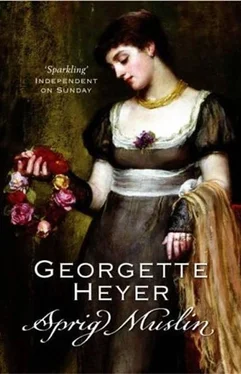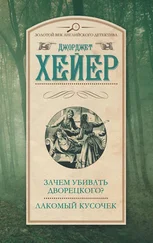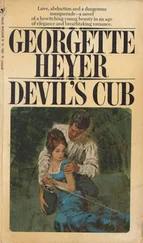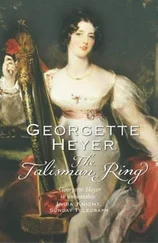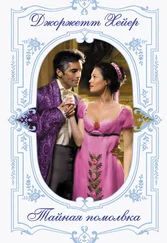Джорджетт Хейер - Sprig Muslin
Здесь есть возможность читать онлайн «Джорджетт Хейер - Sprig Muslin» весь текст электронной книги совершенно бесплатно (целиком полную версию без сокращений). В некоторых случаях можно слушать аудио, скачать через торрент в формате fb2 и присутствует краткое содержание. Год выпуска: 1956, Жанр: Исторические любовные романы, на английском языке. Описание произведения, (предисловие) а так же отзывы посетителей доступны на портале библиотеки ЛибКат.
- Название:Sprig Muslin
- Автор:
- Жанр:
- Год:1956
- ISBN:нет данных
- Рейтинг книги:4 / 5. Голосов: 1
-
Избранное:Добавить в избранное
- Отзывы:
-
Ваша оценка:
- 80
- 1
- 2
- 3
- 4
- 5
Sprig Muslin: краткое содержание, описание и аннотация
Предлагаем к чтению аннотацию, описание, краткое содержание или предисловие (зависит от того, что написал сам автор книги «Sprig Muslin»). Если вы не нашли необходимую информацию о книге — напишите в комментариях, мы постараемся отыскать её.
Sprig Muslin — читать онлайн бесплатно полную книгу (весь текст) целиком
Ниже представлен текст книги, разбитый по страницам. Система сохранения места последней прочитанной страницы, позволяет с удобством читать онлайн бесплатно книгу «Sprig Muslin», без необходимости каждый раз заново искать на чём Вы остановились. Поставьте закладку, и сможете в любой момент перейти на страницу, на которой закончили чтение.
Интервал:
Закладка:
Georgette Heyer
Sprig Muslin
Chapter 1
Mrs. Wetherby was delighted to receive a morning call from her only surviving brother, but for the first half hour of his visit she was granted no opportunity to do more than exchange a few commonplaces with him over the heads of her vociferous offspring.
Sir Gareth Ludlow had arrived in Mount Street just as the schoolroom party, comprising Miss Anna, a lively damsel within a year of her debut, Miss Elizabeth, and Master Philip, were returning from a promenade in the park under the aegis of their governess. No sooner did these delicately nurtured children catch sight of their uncle’s tall, elegant figure than they threw to the winds every precept of gentility, so carefully instilled into their heads by Miss Felbridge, and, with piercing shrieks of: “Uncle Gary, Uncle Gary!” raced helter-skelter down the street, to engulf Sir Gareth on their doorstep. By the time Miss Felbridge, clucking but indulgent, had overtaken them, the butler was holding open the door, and Sir Gareth was being borne into the house by his enthusiastic young relatives. He was being pelted with questions and confidences, his eldest niece hanging affectionately on one arm, and his youngest nephew trying to claim his attention by tugging violently at the other, but he disengaged himself for long enough to offer his hand to Miss Felbridge, saying with the smile which never failed to set her heart fluttering in her chaste bosom: “How do you do? Don’t scold them! It is quite my fault—though why I should have this shocking effect upon them I can’t conceive! Are you quite well again? You were suffering all the discomfort of a bad attack of rheumatism when last we met.”
Miss Felbridge blushed, thanked, and disclaimed, thinking that it was just like dear Sir Gareth to remember such an unimportant thing as the governess’s rheumatism. Any further interchange was cut short by the arrival on the scene of Mr. Leigh Wetherby, who erupted from the library at the back of the house, exclaiming: “Is that Uncle Gary? Oh, by Jove, sir, I’m devilish glad to see you! There’s something I particularly wish to ask you!”
The whole party then swept Sir Gareth upstairs to the drawing-room, all talking at the tops of their voices, and thus deaf to a halfhearted attempt on Miss Felbridge’s part to restrain her charges from bursting in upon their mama in this very irregular fashion.
It would have been useless to have persisted, of course. The young Wetherbys, from Leigh, undergoing the rigours of coaching to enable him to embark upon a University career later in the year, to Philip, wrestling with pothooks and hangers, were unanimous in giving it as their considered opinion that nowhere was there to be found a more admirable uncle than Sir Gareth. An attempt to whisk the younger members off to the schoolroom could only have resulted in failure, or, at the best, in a fit of prolonged sulks.
In the well-chosen words of Mr. Leigh Wetherby, Sir Gareth was the most bang-up fellow that ever drew breath. A noted Corinthian, he was never too high in the instep to show a nephew aspiring to dandyism how to arrange his neckcloth. Master Jack Wetherby, unconcerned with such fopperies as this, spoke warmly of his openhandedness and entire comprehension of the more urgent needs of young gentlemen enduring the privations of life at Eton College. Miss Anna, by no means out yet, knew no greater source of joy and pride than to be taken up to sit beside him in his curricle for a turn or two round the Park, the envy (she was convinced) of every other, less favoured, damsel. As for Miss Elizabeth, and Master Philip, they regarded him as a fount of such dizzy delights as visits to Astley’s Amphitheatre, or a Grand Display of Fireworks, and could perceive no fault in him.
They were not singular: very few people found fault with Gareth Ludlow. Watching him, as he contrived, while displaying over and over again from the edification of little Philip the magical properties of his repeating watch, to lend an ear to the particular problem exercising Leigh’s mind, Mrs. Wetherby thought that you would be hard put to it to find a more attractive man, and wished, as she had done a thousand times before, that she could discover some bride for him lovely enough to drive out of his heart the memory of his dead love. Heaven knew that she had spared no pains during the seven years that had elapsed since Clarissa’s death to accomplish this end. She had introduced to his notice any number of eligible females, several of them as witty as they were beautiful, but she had never been able to detect in his gray eyes so much as the flicker of the look that had warmed them when they had rested on Clarissa Lincombe.
These reflections were interrupted by the entrance of Mr. Wetherby, a dependable-looking man in the early forties, who grasped his brother-in-law’s hand, saying briefly. “Ha, Gary! Glad to see you!” and lost no time in despatching his offspring about their several businesses. This done, he told his wife that she shouldn’t encourage the brats to plague their uncle.
Sir Gareth, having regained possession of his watch and his quizzing glass, slipped the one into his pocket, and hung the other round his neck by its long black riband, and said: “They don’t plague me. I think I had better take Leigh along with me to Crawley Heath next month. A good mill will give him something other to think of than the set of his coats. No, I know you don’t approve of prizefighting, Trixie, but you’ll have the boy trying to join the dandy-set if you don’t take care!”
“Nonsense! You don’t wish to burden yourself with a scrubby schoolboy!” said Warren, imperfectly concealing his gratification at the invitation.
“Yes, I do: I like Leigh. You needn’t fear I shall let him get into mischief: I won’t.”
Mrs. Wetherby broke on in this, giving utterance to the thought in her mind. “Oh, my dear Gary, if you knew how much I long to see you with a son of your own to indulge!”
He smiled at her. “Do you, Trixie? Well, as it chances, it is that subject which has brought me to see you today.” He saw the look of startled consternation in her face, and burst out laughing. “No, no, I am not about to disclose to you the existence of a lusty love-child! Merely that I believe—or rather, that I hope—I may shortly be demanding your felicitations.”
She was for a moment incredulous, and then cried eagerly: “Oh, Gary, is it Alice Stockwell?”
“Alice Stockwell?” he repeated, surprised. “The pretty child you have been throwing in my way? My dear! No!”
“Told you so,” remarked Mr. Wetherby, with quiet satisfaction.
She could not help feeling a little disappointed, for Miss Stockwell had seemed to be of all her protégées the most eligible. She concealed this very creditably, however, and said: “I declare I have not the least guess, then, who it may be. Unless—oh, do, pray, tell me at once, Gary!”
“Why, yes!” he replied, amused at her eagerness. “I have asked Brancaster’s leave to address myself to Lady Hester.” The effect of this announcement was somewhat disconcerting. Warren, in the act of taking a pinch of snuff, was surprised into sniffing far too violently, and fell into a fit of sneezing; and his lady, after staring at her brother as though she could not believe her ears, burst into tears, exclaiming: “Oh, Gary, no! ”
“Beatrix!” he said, between laughter and annoyance. “Gareth, are you hoaxing me? Tell me it’s a take-in! Yes, of course it is! you would never offer for Hester Theale!”
“But, Beatrix—!” he expostulated. “Why should you hold Lady Hester in such aversion?”
“Aversion! Oh, no! But a girl— girl? she must be nine-and-twenty if she’s a day!—a woman who has been on the shelf these nine years, and more, and never took ,or had countenance ,or the least degree of modishness—You must be out of your senses! You must know you have only to throw the handkerchief—Oh, dear, how could you do such a thing?”
Читать дальшеИнтервал:
Закладка:
Похожие книги на «Sprig Muslin»
Представляем Вашему вниманию похожие книги на «Sprig Muslin» списком для выбора. Мы отобрали схожую по названию и смыслу литературу в надежде предоставить читателям больше вариантов отыскать новые, интересные, ещё непрочитанные произведения.
Обсуждение, отзывы о книге «Sprig Muslin» и просто собственные мнения читателей. Оставьте ваши комментарии, напишите, что Вы думаете о произведении, его смысле или главных героях. Укажите что конкретно понравилось, а что нет, и почему Вы так считаете.
